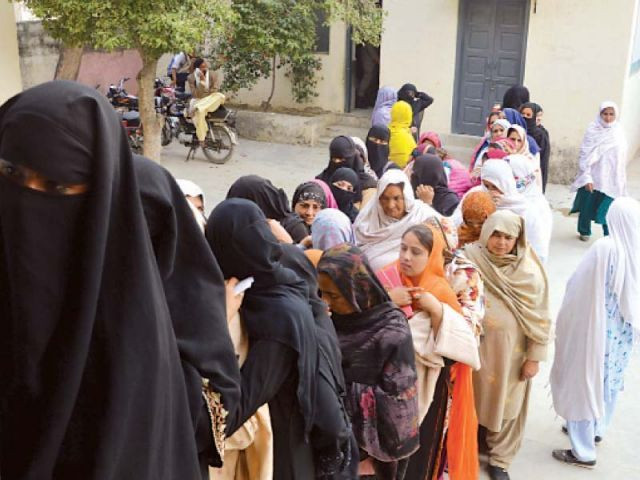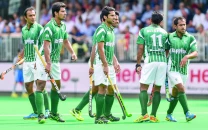Political franchise: Political parties vow to protect women’s right to vote
Say suffrage is a basic indicator of women’s empowerment

Say suffrage is a basic indicator of women’s empowerment. PHOTO: MUDASSAR RAJA/EXPRESS
The Pakistan Tehreek-i-Insaf leaders say the party’s campaign includes women leaders on canvassing for its candidates and raising awareness on the issue. PTI Punjab deputy organiser Omar Sarfraz Cheema says the party is pursuing an aggressive campaign to motivate women voters. He says the government and the ECP had failed to provide security to women in the first and second phase, which had discouraged them from voting.
“It is a historic failure that 60 years after independence, some women are still barred from voting” he says. “There is no framework to ensure their participation in democratic processes. Suffrage is a basic indicator of women empowerment,” he says.
Commenting on complaints of poor women’s turnout in Mianwali, considered a PTI stronghold, Cheema says the party has a zero-tolerance policy for anyone found stopping women voters from voting. “Strict action will be taken against any party member found involved in such activities,” he says.
Representatives of Pakistan Peoples Party say participation of women was integral to the party’s ideology. “But there is only so much political parties can do in this regard,” says PPP’s central information secretary Qamar Zaman Kaira.
“Political parties can raise awareness and motivate voters but ensuring their participating is a task for the government and the ECP,” he says. “Political parties do lobby on the issue, but the real challenge is providing legislative and administrative measures to ensure women’s participation,” he says.
He says during the PPP government, steps had been taken to ensure women’s participation in Gilgit Baltistan and FATA when similar concerns had been raised.
MPA Azma Zahid Bukhari of the Pakistan Muslim League-Nawaz says though the party policy had very clear policy on the issue, it was monitoring its candidates to ensure participation of women in the third phase polls. “It has been observed that local punchayats restricting women from voting in certain areas,” she says. She says there have been no reports yet about women being barred voting in the third phase.
Bukhari says under election rules, results from any polling station where less than 10 per cent women polled would be void.
She says the overall the trend of barring women from voting had decreased. “In the 2008 general elections, there were more than 600 polling stations where women could not vote. The figure has dropped significantly since then.”
Role of the ECP
Rights activist Tahira Abdullah says the ECP should launch a strong and sustained public awareness campaign in this regard. She says no election should be considered valid unless at least 10 per cent of registered women voters had voted.
She says several cases of women being barred from voting are pending with the ECP. She says the case of the by-election in Lower Dir has been pending in Peshawar High Court since May 2015. “Pending cases must be decided as soon as possible.”
“The ECP must publish data showing men and women voters in each polling station and each constituency,” she says.
Abdullah has filed a complaint regarding prohibition of women voters in parts of Mianwali, Khanewal, Toba Tek Singh and Sargodha after the second phase of LG polls.
Punjab Commission on the Status of Women Chairperson Fauzia Viqar says the commission did not receive any complaints during the first phase but complaints had emerged in the second phase, from Khanewal and Mianwali.
The commission, she says, has written to the ECP for a re-poll in Kabirwala. A formal response is awaited, she says.
She says under the monitoring for the third phase, Viqar says the commission has received one complaint from a village in Khushab regarding women being barred from voting in the polls scheduled this weekend. “The commission has written to the DCO, the ECP secretary and the Punjab election commission to ensure women voters are allowed to take part in the polls.
Published in The Express Tribune, December 4th, 2015.



















COMMENTS
Comments are moderated and generally will be posted if they are on-topic and not abusive.
For more information, please see our Comments FAQ